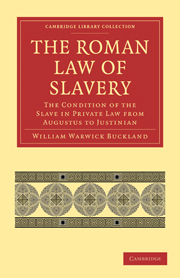Book contents
- Frontmatter
- PREFACE
- Contents
- ERRATA, ADDENDA, AND LIST OF ABBREVIATIONS
- LIST OF PRINCIPAL ABBREVIATIONS
- PART I CONDITION OF THE SLAVE
- CHAPTER I Definition and General Character
- CHAPTER II The Slave as Res
- CHAPTER III The Slave as Res (cont.). Sale of Slaves
- CHAPTER IV The Slave as Man. Non-Commercial Relations
- CHAPTER V The Slave as Man (cont.). Non-Commercial Relations (cont.). Delicts by Slaves
- CHAPTER VI The Slave as Man (cont.) Commercial Relations apart from Peculium. Acquisitions
- CHAPTER VII The Slave as Man (cont.). Commercial Relations apart from Peculium. Liabilities
- CHAPTER VIII The Slave as Man (cont.). Commercial Relations. Peculium. Acquisitions, Alienations, etc
- CHAPTER IX The Slave as Man (cont.). Commercial Relations. Peculium (cont.). Liabilities
- CHAPTER X Special Cases
- CHAPTER XI Special Cases (cont.)
- CHAPTER XII Special Cases (cont.)
- CHAPTER XIII Special Cases (cont.)
- CHAPTER XIV Special Cases (cont.)
- CHAPTER XV Special Cases (cont.)
- CHAPTER XVI Special Cases (cont.)
- PART II ENSLAVEMENT AND RELEASE FROM SLAVERY
- APPENDIX I The relation of the contractual actions adiectitiae qualitatis to the Theory of Representation
- APPENDIX II Formulation and Litis Consumptio in the actions adiectitiae qualitatis
- APPENDIX III Form used by Slave in acquisition by Mancipatio, etc.
- APPENDIX IV The essential character of Manumission: Iteratio
- APPENDIX V Manumission vindicta by a, filiusfamilias
- INDEX
CHAPTER XVI - Special Cases (cont.)
Published online by Cambridge University Press: 07 September 2010
- Frontmatter
- PREFACE
- Contents
- ERRATA, ADDENDA, AND LIST OF ABBREVIATIONS
- LIST OF PRINCIPAL ABBREVIATIONS
- PART I CONDITION OF THE SLAVE
- CHAPTER I Definition and General Character
- CHAPTER II The Slave as Res
- CHAPTER III The Slave as Res (cont.). Sale of Slaves
- CHAPTER IV The Slave as Man. Non-Commercial Relations
- CHAPTER V The Slave as Man (cont.). Non-Commercial Relations (cont.). Delicts by Slaves
- CHAPTER VI The Slave as Man (cont.) Commercial Relations apart from Peculium. Acquisitions
- CHAPTER VII The Slave as Man (cont.). Commercial Relations apart from Peculium. Liabilities
- CHAPTER VIII The Slave as Man (cont.). Commercial Relations. Peculium. Acquisitions, Alienations, etc
- CHAPTER IX The Slave as Man (cont.). Commercial Relations. Peculium (cont.). Liabilities
- CHAPTER X Special Cases
- CHAPTER XI Special Cases (cont.)
- CHAPTER XII Special Cases (cont.)
- CHAPTER XIII Special Cases (cont.)
- CHAPTER XIV Special Cases (cont.)
- CHAPTER XV Special Cases (cont.)
- CHAPTER XVI Special Cases (cont.)
- PART II ENSLAVEMENT AND RELEASE FROM SLAVERY
- APPENDIX I The relation of the contractual actions adiectitiae qualitatis to the Theory of Representation
- APPENDIX II Formulation and Litis Consumptio in the actions adiectitiae qualitatis
- APPENDIX III Form used by Slave in acquisition by Mancipatio, etc.
- APPENDIX IV The essential character of Manumission: Iteratio
- APPENDIX V Manumission vindicta by a, filiusfamilias
- INDEX
Summary
Servus Communis
Regarded purely as a chattel, there is little to be said of the servus communis. The general principles of common ownership apply, and a few remarks will therefore suffice. He is the property of the owners in undivided shares, and possession of him by one of his owners, omnium nomine, is possession by all. A legacy of “my slaves” includes those in whom I own a share. They are reckoned, pro Falcidia, in the estate of each owner. The rights of ownership are necessarily somewhat cut down in view of the rights of other owners. Thus one of common owners cannot put the slave to torture, save in a matter of common interest. On the same principle, the actio servi corrupti is available to one master against another. The text appears corrupt, and there are signs of doubt, which may be due to the fact that the slave is the wrongdoer's own in a sense—a fact which is allowed to bar any action on servi cormptio, for receptio, i.e. of a fugitivus, against a co-owner. But even here Ulpian inclines to allow the action if the reception was celandi animo, though he quotes Julian as refusing it in any case. It is not easy to see why the relation makes any difference, since the act is presumably a furtum, for which Paul and Ulpian are clear that actio furti will lie against a co-owner. In all these cases an indemnity can be claimed by commwni dividundo, or, if they are socii, by pro sodow.
- Type
- Chapter
- Information
- The Roman Law of SlaveryThe Condition of the Slave in Private Law from Augustus to Justinian, pp. 372 - 396Publisher: Cambridge University PressPrint publication year: 2010First published in: 1908



